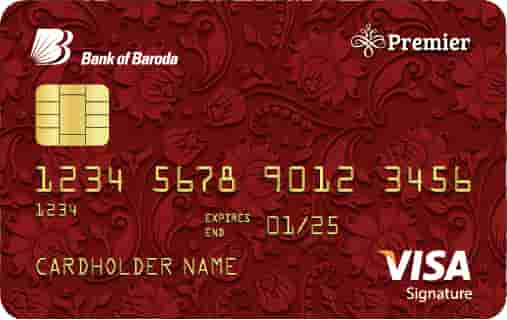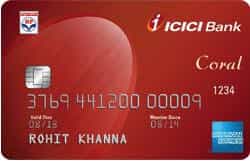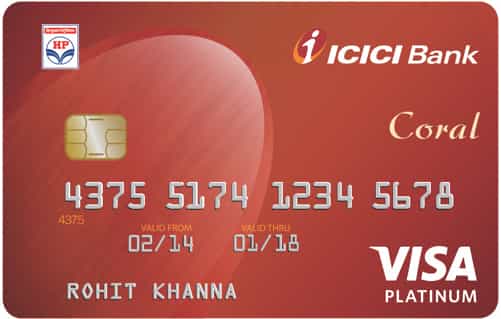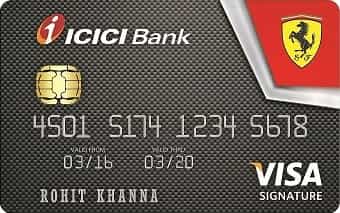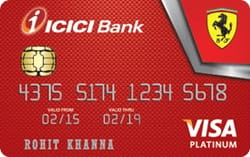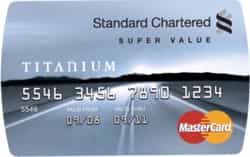Best Fuel Credit Cards in India
Fuel credit cards give you two benefits, they not only save you on fuel surcharge but also rewards you with fuel points. These reward points can be exchanged with free fuel. Each of these cards offers varying rewards on other categories as well. We analyzed all credit card offers with fuel rewards to get to our top recommendations. Review the best fuel rewards credit card offers from our partners below and apply for the card that best fit.
- Earn 4 Turbo points at IndianOil outlets
- 2 Turbo Points at grocery and supermarkets; 1 Turbo Point on all other spent
- Fee waiver of Rs 1000 on annual spends of Rs 30000
- Never - expiring reward points
- ₹250 Turbo Points on your first spend within 30 days of card issuance.
-
Get up to 71 liters of free fuel in the first year
- Fee waiver of ₹1,000 on annual spends of ₹30,000
- Turbo points worth ₹250 on card activation
- Additional points worth ₹3,650**
- Never - expiring reward points
- Instantly Pay with Points at select partners
- Simply tap and pay using a contactless card
- Get 5 points on Grocery, Departmental stores & Movies
- Get 1 points on others
- Zero fuel surcharge
- 0.5% cashback on card bill payment
- Get free Personal Accidental Death Cover to ensure financial protection of your family
- 1 Reward points for every ₹100 spent
- 5X rewards on Grocery, Departmental stores, Movies for every ₹100 spent
- 0.5% cashback on card bill payment
- 1% fuel surcharge waived for all transactions between ₹400 - ₹5,000
- Spend ₹6,000 within 60 days and ₹35,000 in a year for reversal/waiver of annual fees
- Get 5 points on Dining, Utility bills, Online shopping
- Get 1 points on others
- Zero fuel surcharge
- 1,000 bonus rewards points every month
- Get free Personal Accidental Death Cover to ensure financial protection of your family
- 1 Reward points for every ₹100 spent
- 5X rewards on Dining, Utility bills, Online shopping for every ₹100 spent
- 1,000 bonus rewards points every month
- 1% fuel surcharge waived for all transactions between ₹400 - ₹5,000
- Spend 7,500 within 60 days and 70,000 in a year, for reversal/waiver of annual fees
- 5X Rewards are capped at 1,000 Reward Points on the mentioned categories per month. Further spends in that month on these categories will earn Reward Points at the regular earn rate
- Get 10 rewards on travel, dining and abroad
- Get 2 points on others
- Zero fuel surcharge
- Complimentary airport lounge, 24x7 concierge, Golf program
- Get free Personal Accidental Death Cover to ensure financial protection of your family
- 2 Reward points for every ₹100 spent
- 10 rewards on travel, dining and abroad for every ₹100 spent
- Complimentary airport lounge, 24x7 concierge, Golf program
- 5X Rewards are capped at 2,000 Reward Points on the mentioned categories per month. Further spends in that month on these categories will earn Reward Points at the regular earn rate
- 6 PAYBACK Points on fuel at HPCL pumps
- Get 2 PAYBACK on others
- Enjoy ₹100 discount on up to 2 movie tickets per month at www.bookmyshow.com
- Minimum 15% savings on dining at over 800 restaurants courtesy our Culinary Treats program
- Get 2.5% cashback* and savings of 1% fuel surcharge* on fuel purchases at HPCL pumps
- Earn 3X or 6 PAYBACK Points per ₹100 spent on fuel at HPCL pumps
- Redeem 2,000 PAYBACK Points for fuel worth ₹500
- Get 2.5% cashback* and savings of 1% fuel surcharge* on fuel purchases at HPCL pumps
- Enjoy ₹100 discount on up to 2 movie tickets per month at www.bookmyshow.com
- Minimum 15% savings on dining at over 800 restaurants courtesy our Culinary Treats program
- Enrich your travel experience with complimentary access to select lounges at airports in India with your ICICI Bank HPCL Coral American Express® Credit Card. To avail, please present your Card at the lounge reception
- Get 2 PAYBACK points
- ₹100 off on movie tickets
- Minimum 15% savings on dining
- Reduce fuel bills with 2.5% Cashback
- Save on 1% fuel surcharge
- Reduce fuel bills with 2.5% Cashback
- Save on 1% fuel surcharge
- Get ₹100 off on movie tickets any day of the week, through www.bookmyshow.com. You can avail this discount twice each month or save ₹2,400 each year!
- Minimum 15% savings on dining at over 800 leading restaurants across cities in India.
- Earn 2 PAYBACK Points on every ₹100 spent on retail purchases except fuel.
- Redeem your PAYBACK Points from movie and travel vouchers to lifestyle products, mobiles, appliances and more.
- Spend ₹50,000 or more annually on your Card and we will reverse your Annual Fee (₹199) for that year.
- Make 5 transactions each month on your ICICI Bank American Express Credit Card and get a bookmyshow e-voucher worth Rs.400
- Get 2 PAYBACK on every purchase except fuel
- Enjoy ₹100 discount on up to 2 movie tickets per month at www.bookmyshow.com
- Minimum 15% savings on dining at over 800 restaurants courtesy our Culinary Treats program
- Get 2.5% cashback* and savings of 1% fuel surcharge* on fuel purchases at HPCL pumps
- Earn 2 PAYBACK Points per ₹100 spent on retail purchases except fuel
- Redeem 2,000 PAYBACK Points for fuel worth ₹500
- Get 2.5% cashback* and savings of 1% fuel surcharge* on fuel purchases at HPCL pumps
- Enjoy ₹100 discount on up to 2 movie tickets per month at www.bookmyshow.com
- Minimum 15% savings on dining at over 800 restaurants courtesy our Culinary Treats program
- Get 2 PAYBACK on every purchase except fuel
- 2 complimentary movie tickets every month under the Buy One Get One free offer
- 15% savings on dining bills at over 2500+ participating restaurants across India
- complimentary Scuderia Ferrari watch
- Earn 2 PAYBACK Points on every ₹100 spent for all retail purchases except fuel.
- Complimentary Scuderia Ferrari watch on joining
- Opportunity to attend an official Ferrari Challenge race*
- Visit to the Ferrari Museum and Factory in Maranello, Italy*
- Attend an event with special Ferrari VIP guests in Maranello, Italy*
- Discounts on Ferrari merchandise at the Online Ferrari Store upon registering at http://f1member.ferrari.com/ **
- 15% discount on entry tickets to Ferrari World Abu Dhabi for tickets bought at the park counter
- Complimentary Access to domestic airport lounges in India
- Buy One Get One offer on www.bookmyshow.com, Get up to 2 free tickets per month valued up to ₹ 300 per ticket
- Buy 1, Get 1 offer at INOX Cinemas, Get up to 2 free tickets per month valued up to ₹ 300 per ticket
- 15% savings on dining bills at over 2500+ participating restaurants across India through Culinary Treats Programme
- Save 1% on fuel surcharge
- Up to 20% discount on Ferrari merchandise at the Ferrari Store in Maranello, Italy
- Up to 15% discount on Ferrari merchandise at the Online Ferrari Store upon registering at http://f1member.ferrari.com
- Get 2 PAYBACK on every purchase except fuel
- 2 complimentary movie tickets every month under the Buy One Get One free offer
- 15% savings on dining bills at over 800 restaurants across India
- Save on 1% fuel surcharge
- 1 complimentary domestic Airport Lounge visit per quarter
- 2 complimentary movie tickets every month under the Buy 1, Get 1 offer from BookMyShow
- Buy 1, Get 1 offer at INOX Cinemas
- 15% savings on dining bills at over 800 restaurants across India through the Culinary Treats Programme
- Save 1% on fuel surcharge
- 15% discount on entry tickets to Ferrari World Abu Dhabi for tickets bought at the park counter
- Up to 20% discount on Ferrari merchandise at the Ferrari Store in Maranello, Italy
- Up to 15% discount on Ferrari merchandise at the Online Ferrari Store upon registering at http://f1member.ferrari.com
- 5% cashback on fuel
- 5% cashback on telephone bills
- 5% cashback on utility bills
- Get 1 reward point
- Save up to Rs 6,000 p.a. monthly expenses with Super Value Titanium credit card.
- 5% cashback on fuel maximum of INR 200 per month
- 5% cashback on telephone bills maximum of INR 200 per month
- 5% cashback on utility bills maximum of INR 100 per month
- Get 1 reward point for every INR 150 when you use your credit card for all other expenses.
- Enjoy a host of discounts and offers across dining, shopping, travel and many more with the Standard Chartered Good Life programme
Indianoil Citi Credit Card
Rewards Rate
- For every ₹150 you spend
Benefits
Fee
₹1,000
SignUp Bonus
Card Brand
Card Details
Bank of Baroda Easy Credit Card
Rewards Rate
- For every ₹100 you spend
Benefits
Fee
₹500
In-built insurance cover
Card Brand
Card Details
Bank of Baroda Select Credit Card
Rewards Rate
- For every ₹100 you spend
Benefits
Fee
₹750
In-built insurance cover
Card Brand
Card Details
Bank of Baroda Premier Credit Card
Rewards Rate
- For every ₹100 you spend
Benefits
Fee
₹1,000
In-built insurance cover
Card Brand
Card Details
ICICI Bank HPCL Coral American Express Credit Card
Rewards Rate
- For every ₹100 you spend
Benefits
Fee
₹ 199
Fuel Benefits
Card Brand
Card Details
ICICI HPCL Platinum Credit Card
Rewards Rate
- For every ₹100 you spend
Benefits
Fee
₹ 199
Fuel Benefits
Card Brand
Card Details
ICICI HPCL Coral Credit Card
Rewards Rate
- For every ₹100 you spend
Benefits
Fee
₹ 199
Fuel Benefits
Card Brand
Card Details
ICICI Bank Ferrari Signature Credit Card
Rewards Rate
- For every ₹100 you spend
Benefits
Fee
₹3,999
Welcome Benefits
Card Brand
Card Details
ICICI Ferrari Platinum Credit Card
Rewards Rate
- For every ₹100 you spend
Benefits
Fee
₹499
Fuel Benefits
Card Brand
Card Details
Standard Chartered Super Value Titanium Credit Card
Cashback Rate
Rewards Rate
- For every ₹150 you spend
Fee
₹750
Benefits
Card Brand
Card Details
WHAT KINDS OF OFFERS CAN YOU GET USING A FUEL CARD?
Find the below list of credit cards that offer several benefits when you use them for your fuel purchases.Standard Chartered Super Value Titanium Credit Card gives 5% cashback on fuel purchases, telephone, and utility bill payments. This card provides you a complimentary Priority Pass, allowing access to 1000+ airport lounges worldwide with one free usage per month. You can also convert your big spends above ₹5,000 to easy EMIs. Balance Transfer up to 5,00,000 from other banks.
Bank of Baroda Premier Credit Card gives you 10 reward points on travel, dining, and abroad spendings. This card provides you complimentary access to airport lounges, 24x7 travel assistance at the hotel, free golf programs. There is an annual fee of ₹1,000 + applicable GST and if you spend ₹10,000 within 60 days or ₹1,20,000 in a calendar year then you can ask for a reversal of annual fees and get a fee waiver for subsequent years.
Bank of Baroda Easy Credit Card gives 5 reward points on grocery and departmental store purchases, and on movie tickets. You can get 1% fuel surcharge waived for all transactions between ₹400 to ₹5,000. There is an annual fee of ₹500 + GST for holding this card and if you spend ₹6,000 within 60 days and ₹35,000 in a year you can ask for a reversal of annual fees.
ICICI HPCL Coral Credit Card gives 6 PAYBACK points and 2.5% cashback and savings of 1% fuel surcharge on fuel purchases at HPCL pumps. The card also provides ₹100 discount on up to 2 movie tickets per month at bookmyshow. Minimum 15% savings on dining at over 800 restaurants.
ICICI Ferrari Signature Credit Card 2 complimentary movie tickets every month under the “Buy One Get One Free” offer plus 15% savings on dining bills at over 2500+ participating restaurants across India. You can get a complimentary Scuderia Ferrari watch as a signup bonus. There is a joining fee of ₹3,999 + GST and an annual fee of ₹999 + GST from the second year onwards. The annual fee is waived off if you spend more than ₹2,50,000 in any calendar year.
HOW MUCH YOU CAN SAVE IF YOU USE THE RIGHT FUEL CREDIT CARD?
Fuel credit cards provide special rewards like cashback and fuel surcharge waiver on purchasing fuel.Let’s say you travel 25 kilometers per day for 5 days a week and 75 kilometers on the weekends, which means you travel 200 kilometers per week or 10,400 kilometers a year. The average cost of fuel in India on May 24, 2020, is between ₹ 67 to ₹ 78 depending on which state you live in, and if you are driving a 2020 Maruti Swift that gives you a millage of 20 kilometers per liter then you will spend ₹ 780(78* 200/20) for the week. Yearly ₹40,560.
Standard Chartered Super Value Titanium Credit Card gives 5% cashback on fuel purchases that means you will get ₹ 2,028 cashback. Note that Standard Chartered Super Value Titanium Credit Card has a max cashback of ₹ 200 per month.
If you use ICICI HPCL Coral Credit Card then you get a total of ₹ 1419 as you get a max of 3.5% cashback (₹ 40,560 * 3.5%).
But if your total spending on fuel is say ₹ 1,00,000 annually, then you can get a max of ₹2,400 using Standard Chartered Super Value Titanium card due to its max cap per month whereas if you use ICICI Bank HPCL credit card you can earn up to ₹3,500.
HOW TO EVALUATE OVERALL BENFITS OF FUEL CREDIT CARDS?
If all fuel cards are free to use then you can easily choose a card just based on the cashback or savings on fuel surcharges but not all cards are free. So you need to count annual fees you need to pay to hold and enjoy the benefits of certain cards. Paying annual fees is not always bad if you find the right card that gives you a higher overall benefit. Along with annual fees you also have to consider reward and burn rates and signup bonuses to understand the overall value a card can provide for your spendings.Reward rate is the amount of rewards you earn per rupee you spend and burn rate is the value you get when you redeem your reward points. For example, if the reward rate is 1 Point for every ₹100 spent and each point equals ₹1, then if you spend ₹25000 per year then you can get upto ₹250.
TIPS TO KEEP YOUR DEBT LOWER
Budget: You need to create a budget for yourself. Making the most of each rupee coming in and going out will help you stay focused on your spending and also helps you to pay off your debt.Lower your bills: By cutting down you’re spendings by paying attention to your credit card bills every month, you’ll have additional cash saved that you can use to pay your debts.
HEALTHY HABITS YOU NEED WHEN USING CREDIT CARDS
On-time payments: pay your bills regularly and don’t just pay minimum dues while you save cash. Pay your bills in total as and when possible. Your payment history has a very high impact on your credit score.Utilization: You have to try to keep your overall credit card utilization to less than 30%. Using most of your credit limits also has a high impact on your credit score.
Available credit: One rule of thumb you always keep in mind is to increase your line of credit and limit your spendings.
One way to control your spendings is to create a budget plan and cut down any extra spendings by continuously monitoring your monthly credit card bills. You can use the CRED app to keep track of your history of all of your cards. Find out our review about the CRED app.
One thing to keep in mind is that the issuer does a credit inquiry when you apply for a new credit card. So do not apply for multiple cards at once: Keep your credit inquiries lower.
REASONS TO GET A CREDIT CARD
Using credit cards is not for everyone. You need to have financial discipline if you plan to use credit cards. Cebit cards are appealing because they allow you to quickly borrow money and can easily rack up debt if you don't regularly pay bills. But using them also helps you to establish a credit history and creditworthiness which is also important in these modern economies. If you are very good at managing your money and have discipline, credit cards can give you a wide variety of benefits and save you money. Using credit cards you can earn while you spend.Signup bonuses: Some cards provide signup bonuses and perks will at least in most cases cover-up for the joining fees.
Flexibility: If you are a salaried employee who depends on fixed regular income then using a credit card can give you flexibility on managing your fixed income. Say if you have a big expense coming up in the future then you can either plan to pay part of your credit card bill and save some money for those big expenses and convert your credit card bill into EMIs and avoid borrowing personal loans.
Frequently asked questions
Do fuel cards save money?
What is the best fuel card?
Is fuel cheaper with a fuel card?
What is a fuel credit card?
What is the benefit of a fuel card?



